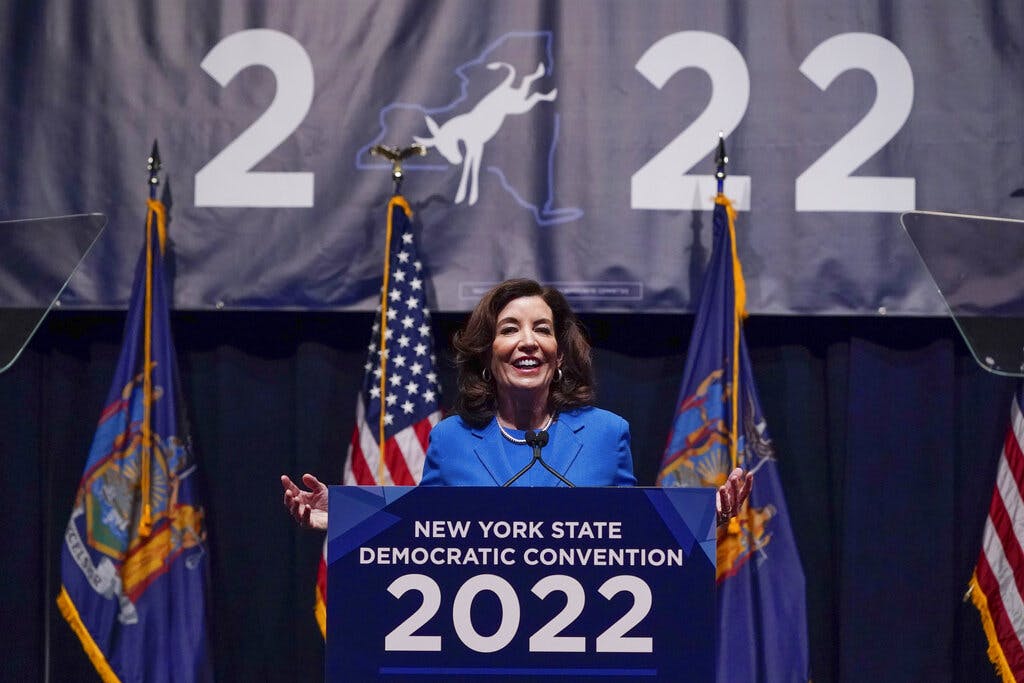‘Cynical’ Budget Move Has Mayoral Control of NYC Schools in Limbo
Governor Hochul in her proposed budget included a four-year extension of the mayoral control mandate. The state senate and assembly omitted this provision in their proposed budgets.

Albany could see a struggle over mayoral control of New York City schools, as state budget negotiations move forward without consensus on the issue.
Governor Hochul in her proposed budget included a four-year extension of the mayoral control mandate, which would cover Mayor Adams’s term. The state senate and assembly omitted this provision in their proposed budgets, effectively rejecting mayoral control in the first round of negotiations.
Under the current system, the mayor appoints the chancellor and the majority of members on the Panel for Education Policy, the city’s school board. The mayor’s ability to do so is granted by the state legislature via time-delimited extensions, usually of two to five years.
Prior to the establishment of mayor control under Mayor Bloomberg, New York City public schools were managed by an independent Board of Education, which appointed its own chancellor, and there were 32 decentralized, elected community school boards.
Senator John Liu, a Democrat who represents New York 11th district, defended the omission of mayoral control on procedural grounds. “We’ve been debating the budget,” he said. “Mayoral control does not have fiscal implications.”
Mr. Liu also expressed more substantive concerns with mayoral oversight of the schools. Because the governor’s request for a four-extension would cover Mr. Adams’s entire term, Mr. Liu argues the mayor would not be accountable to voters on education issues.
“Parents feel that they’ve been left out of the process,” he said. “We have heard incessantly from a very broad and diverse array of parents throughout the city that they have no recourse and no opportunities to provide constructive suggestions.”
In particular, Mr. Liu cited parental frustration over in-person learning requirements during the Covid omicron variant outbreak, claiming that there was a “very high absentee rate among students because their parents didn’t feel comfortable.”
A number of alternatives to mayoral control are under active consideration by the legislature, according to Mr. Liu. One would be abolishing mayoral control altogether and moving toward democratically elected school boards — for which Chicago would be the model.
There are also a number of ways to limit the mayor’s power over the Panel for Education Policy: requiring a fixed number of seats for democratically elected parent members on the board through the Community Education Councils, creating fixed terms for appointees, and/or giving the city comptroller a seat on the board.
Earlier this month, in testimony before the state legislature, the president of the United Federation of Teachers, Michael Mulgrew, expressed the union’s “concern” over mayoral control. He proposed similar measures to those outlined by Mr. Liu: reserving board seats for Community Education Council appointees, fixed terms for Panel for Education Policy members, and the continued inclusion of a sunset clause that prevent permanent mayoral control from becoming law.
Mr. Liu is advocating for hearings on the issue of mayoral control that would not be constrained by the budget approval deadline of April 1.
“We have a fair amount of time. This term expires in June, the school year begins in September,” he said. “It’s not urgent enough that we won’t take the time to properly consider how to move forward.”
The Manhattan Institute’s director of education policy, Ray Domanico, sees the idea of extended hearings as a “cynical” move on the part of the legislature: “They’re holding the schools hostage, but this is politics.” He sees the proposed hearings as a “bargaining chip” to be used against Mr. Adams.
According to Mr. Domanico, the decision to renew mayoral control should not be a difficult one. “The evidence is very clear for over 20 years now that mayoral control control has worked in the city,” he said. “Not only has there been measurable improvement in student achievement but spending has increased tremendously.”
Regarding the proposed alternatives, Mr. Domanico said that “going back to a system in which you don’t have one person accountable and in charge, meaning the mayor, would be a disaster. The previous 30 years of history in New York City under decentralized control were a mess.”
Ultimately, even advocates of limiting mayoral control don’t see any changes being likely.
An education professor at Brooklyn College and CUNY Graduate Center, David Bloomfield, has advocated for democratizing school control through what he calls “city control,” a shared oversight involving the mayor and City Council.
“The only issue really is the extension. It’s not the substance of mayoral control,” said Mr. Bloomfield. “Certainly there will be no changes in the near term and the only question now is whether we have an extension of three years or four years, and my bet is that the governor gets her way, and there will be an extension through the mayor’s current term.”
While mayoral control is unlikely to be overturned, the demands for parental oversight in public schooling are perhaps part of a broader movement of concerned parents on both sides of the political aisle.
Opposition to mayoral control is a cause more among liberals in New York, but the demands for parental oversight resonate with calls for curriculum transparency from more conservative critics of critical race theory across the country.
In November, Senator Hawley introduced a “Parents’ Bill of Rights Act” that attempted to tie federal education funding to both parental access to information in schools and parental choice regarding extracurriculars.
Legislators in 19 states have introduced curriculum transparency measures at the state level. New York is not one of them.

